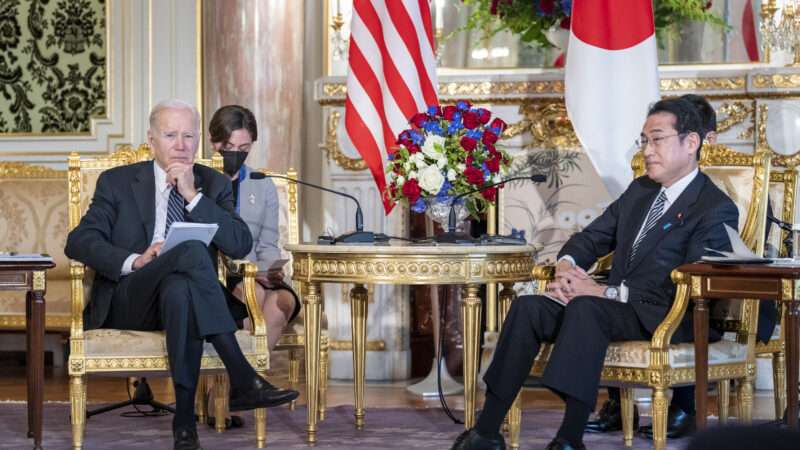
On Monday, many journalists and pundits jumped to the conclusion that President Joe Biden was abandoning America's long-held "strategic ambiguity" concerning the defense of Taiwan. At a news conference with Japanese Prime Minister Fumio Kishida when asked, "Are you willing to get involved militarily to defend Taiwan if it comes to that?" Biden responded "yes" with confidence, following that up with, "that's the commitment we made." (The White House quickly walked his comments back.)
The commitment that Biden is referencing is the Taiwan Relations Act (TRA), which he supported as a member of the Senate Committee on Foreign Relations in 1979. The TRA basically guarantees that the U.S. will make sure that Taiwan has the ability to defend itself. However, the TRA doesn't include a binding agreement the way agreements like NATO do. Legally, the U.S. has never promised to defend Taiwan as it has with NATO countries. Eric Gomez, the director of Defense Policy Studies at the Cato Institute, tells Reason that the TRA was "the price of admission for U.S.-China relations."
How the U.S. will respond to an invasion of Taiwan is strategically gray for two reasons: to keep China on its toes and to ensure the pathways of communication between the U.S. and China stay open. "Biden's statement is not as far outside the bounds of 'strategic ambiguity' as people think," says Gomez—suggesting that Biden's recent remarks have been somewhat blown out of proportion. But he's adamant that if Biden were to go even slightly further to throw "strategic ambiguity" out the window then the U.S. will inevitably show more overt support for Taiwan. After that, all bets are off on how China will respond.
China sees self-ruled Taiwan as a "breakaway province" that will eventually be reunited with the rest of the mainland. But, Taiwan fervently identifies as an independent nation with its own democratically elected leaders. China and Taiwan have had separate governments since 1949. They were united under the same regime for just four of the last 127 years. And Taiwan is essentially united in wanting to be free of Beijing's rule. But the relationship between China and Taiwan has been delicate since the 17th century. As Liz Wolfe wrote for the February issue of Reason:
China's complicated relationship with Taiwan began in 1684, when the Qing dynasty seized the island … At the end of the 19th century, Chinese rulers, facing a humiliating war defeat, gave Taiwan to Japan; following Japan's loss in World War II, it was returned to the mainland. But just a few years later, civil war split the country apart. The Chinese Nationalist Party (or "Kuomintang") was exiled to Taiwan and would go on to exercise martial law there for nearly 40 years. … Despite this messy backstory, democracy and pluralism have flourished in Taiwan since the end of the Kuomintang's dictatorial reign in 1987. As in Singapore, Hong Kong, and South Korea, the rapid industrialization of the 1960s has produced lasting economic strength for Taiwan.
Biden is not the first president who has failed to thread the needle when describing the U.S. commitment to Taiwan. During the 1995–1996 Taiwan Strait crisis, former President Bill Clinton sent two carrier battle groups to Taiwan's waters to intimidate China while Taiwan held free elections. In 2001, former President George W. Bush was asked by ABC about the U.S. commitment to the Taiwanese, and whether the United States would use "the full force of the American military," to which Bush responded, "whatever it took to help Taiwan defend herself." And former President Donald Trump was known for cozying up to Taiwan in order to be tough on China.
Gomez isn't the only one worried about what would happen if Biden's missteps were to become viewed as the U.S.'s new policy by Chinese President Xi Jinping. And some, like Bill Bishop, who writes the popular newsletter Sinocism, already fear that "strategic ambiguity" is a thing of the past.
How many "gaffes" has Biden made about the US defending Taiwan that the White House then tries to clean up? Four? At some point obvious they are not gaffes, and if you are Xi you assume US will defend. So "strategic ambiguity" looks dead
— Bill Bishop (@niubi) May 23, 2022
Yet others, like Matthew Kroenig, deputy director of the Atlantic Council's Scowcroft Center for Strategy and Security, are praising the apparent end to "strategic ambiguity" because it will usher in an era of "strategic clarity" where both the U.S. and China will theoretically be better off knowing where the other stands when it comes to Taiwan.
"This confusion is dangerous to the extent that it could change China's assessment of the issue," says Gomez. It remains to be seen whether Xi chalks up Biden's latest remarks as an accidental straying from "strategic ambiguity" or if he interprets the comments as part of a larger trend worthy of concern.
The post A Classic Biden Gaffe Complicates U.S. Role in Taiwan appeared first on Reason.com.







